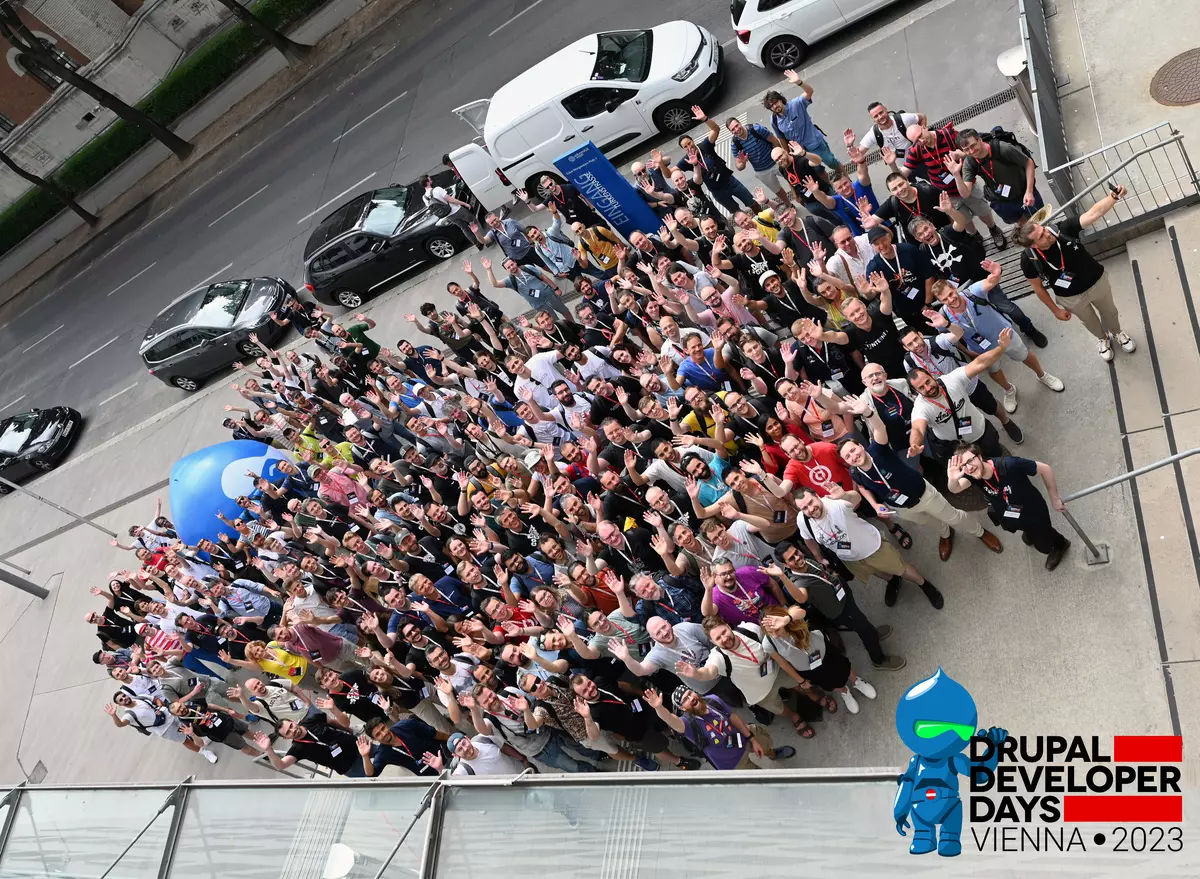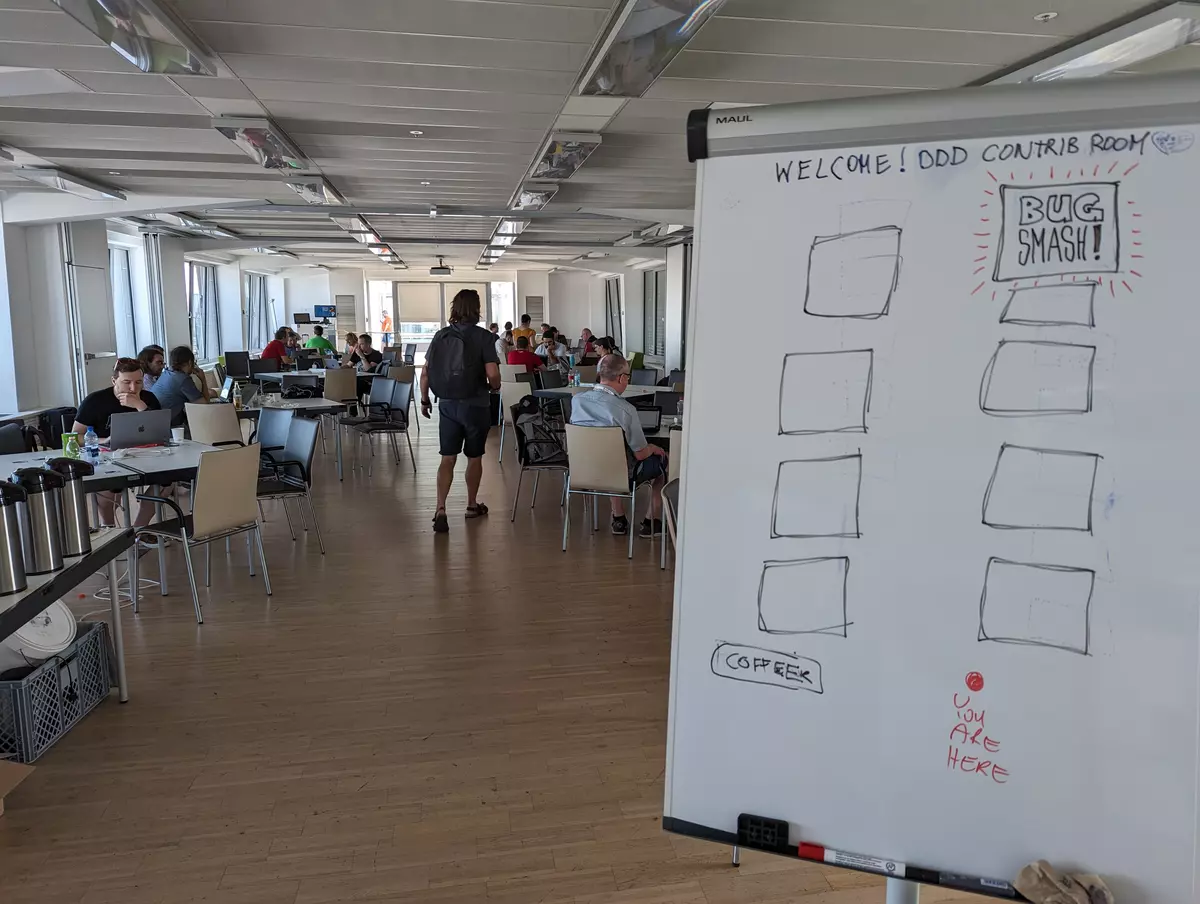Drupal Dev Days 2023 ended 10 days ago and it was great!
Let me explain what happens during a Drupal Dev Days for those who haven't been there. It's like a Drupal Camp, but with more diverse attendees because it is not a local event but an international one.
Usually, there are many sessions talking about many different topics, not only about Drupal, as you can see below. The sessions are selected from all the people that submitted a session proposal prior to the event. Thus, the sessions come from the Drupal Community folks or other people interested in the event. While there are big names between the speakers, those events always feature speakers that are not known and it may be the first they hold a session. Drupal is a very open and welcoming community and we love new people to come and enjoy it.

Official Drupal Developer Days 2023 Vienna Group Picture by Nico Grienauer.
Apart from the sessions, there's something very important going on: the contribution rooms. Those rooms are prepared so anyone can join with their computer and work on Drupal patches, ideas or designs. Here, for example, you can find people from the different Drupal Stratregic Initiatives that are working to push them forward. You can join them helping any initiative, whether it is just testing some patches, doing bug report triage or contributing or improving patches to solve open issues. Sure, you can do it from home, but here the human dimension is open: you can discuss face to face with people who are deeply involved, learn from them and help with the future of Drupal.

Contribution room, only the Bug Smash Initiave has claimed a table yet. Picture by MrTinto.
The sessions
There were many and very good talks. While you can watch all checking the YouTube list made public by Drupal Austria I would like to highlight some of them. They are not necessarily the best and most recommended ones, mainly because I don't have feedback from all the talks and I attended only some of them, but these ones I think they are worth knowing.
I have grouped them by different topics.
Artificial intelligences and their demons
Of course we have to talk about IAs. It is the hot topic, it is impossible to escape from this subject nowadays. There were some talks about generating content with the help of IAs. Surprisingly, there was not a talk about generating code using IA (or I am not aware of it). I think there was a BoF about it but I missed it (please tell me how it was if you were there). But I would like to point to another direction, thanks to two the sessions. And this direction is the IAs and the bias, discrimination and other terrible results of their use.
Preston So, in his keynote, spoke about different topics on machines, humans and IAs, but one of the most interesting is how we introduce our bias, or the bias of the society, into the automatic and heartless systems we are building, and real examples of the consequences. And this is invisible for many people because they are not impacted by those things. Yet, I may say.
I think it is something to take into account. Carina Zehetmaier talked in more detail about this topic on her session When AI Takes Decisions For Us - From Algorithmic Bias to Discrimination in the World, going further into those possible scenarios in which machines make decisions instead of humans. Of course this can be good for us, but it has some implications that we need to be aware of.
Drupal development
You may have come here for the hardcore stuff, so let's start with it. Of course, there were sessions to deep dive into Drupal, let's check some of them.
Sascha Grossenbacher, better known as Berdir at Drupal.org, gave so many details about entities in his session that this should be a reference talk when dealing with them. It is not a talk to just watch, it's worth taking notes and watching it again every time you need a refresher on entities.
Álvaro Hurtado explained why Module Builder should be in you tool belt if you develop your own modules. Let me make a spoiler: it is smarter than the already impressive Drush generate command. Module Builder is able to generate code tailored to your project because it scans and analyzes your code! Give it a try! By the way, the talk was originally intended to be given by joahcim, the module maintainer, but he could not make it to Dev Days and Álvaro took it upon himself to share the goodness of Module Builder on his behalf.
There was a session about DDEV by Miro Michalicka that it is a perfect fit for those who haven't used it yet and want to. DDEV makes local development much easier thanks to Docker and all the commands and functionalities that it provides, including recipes for many local setups, not only for Drupal. At this point I must say that even though I think DDEV is an awesome tool I'm choosing another one. In Metadrop we have created a Drupal Boilerplate based on Docker4Drupal that solves the same problem: having a local environment working with just a few commands. And we use it because it provides a more Drupal tailored environment out of the box and with just one composer command, including several tests tools like Behat or BackstopJS, static code analysis or project documentation thanks to MkDocs, and of course a Docker infrastructure. For the future, one idea is to allow using DDEV with it, but at the moment it just a nice to have idea.
xjm featured a session about peer code review based on her long experience as a core committer since 2015 and core patch reviewing since 2011. I consider peer code review as an invaluable development practice and this talk makes clear why: building teams, sharing project's knowledge, boosting junior developers and detecting issues before they hit production in very cost-effective way. She not only shares information about why it is a good practice for your project, but also about when code review is effective and when it is not, how to structure your changes for better code reviews and some automatic tools to help on this.
I'm finishing this section with my own talk. Sorry for the self-promotion but I honestly think this talk can help developers when dealing with complex forms using the Drupal's Form API. In this session I explain the Form API workflow, from a simplified workflow to the complex workflow with the most important details, including AJAX forms or the modification opportunities during a form life cycle.
Drupal present and future
There's always sessions about the current state of Drupal and specially what is the future of Drupal. Let's start with the talk by Gábor Hojtsy about the Drupal initiatives. Here you learn what they are, how are they organized and funded, the genesis of the initiatives and information about the current and future ones.
Hungry for more? Don't worry, there were several sessions focused on some of the initiatives. Check the talk about the future Drupal Dashboard, So I logged in, now what? The Dashboard initiative welcomes you, or the one about the incoming improvements on the Admin UI (they are doing a really great job!) or the current state of the Automatic Updates.
I would like to stop on the Drupal 10: What’s New and What’s Next session by Lauri Eskola. Deeply involved in the core development, Lauri talked about the current focus, or at least one of the most important focus for Drupal: improving the user experience in general and the content editor experience in particular. Drupal has a powerful content management system, allowing rich and complex content models, either using the GUI or as a framework. However, editors expect an easier and intuitive interface. Several efforts are trying to fix this, and in the recent
Pitch-burgh innovation contest, two of the selected projects were related to improvements on the editorial experience. As Dries Buytaert said, Drupal is for ambitious site builders and the Community is pushing to make this a completely true statement. In his talk, Lauri mentions this around the minute 26, saying "we're doing discovery on a modernized page building experience" based on Layout Builder. And here I want to introduce you to the Visual Layout Suite, a module we developed with this idea in mind for one of our clients. We firmly believe the VLSuite is a good path to improve this content editor issue. The folks of Drupal Dev Days selected the session were my colleague Cristian Aliaga explains the VLSuite in detail, so you can judge by yourself. I'm there as well, but only as a support, all the hard work was done by him. The VLSuite aims to solve or reduce this problem with a solution based on Layout Builder, with no dependencies on themes, distributions or external services and compatible with current core approaches.
Miscellaneous
Paolo Mainardi featured a talk titled What is the secure software supply chain and the current state of the PHP ecosystem and I absolutely loved it. While this talk was not directly about Drupal it is very interesting from the point of view of security, including how to secure your supply chains.
As I said, there were many talks and I'm sure I missed some good ones, but these are interesting in some way or another. And let me finish linking the talk of another colleague, Omar Lopesino, about using Drupal as backend for a rich mobile application, in this case for iOS. The project features Apple in app purchases, among other features, and was a good challenge. Check what he wants to share with other developers in case you are in a similar project in his session Build Feature-Rich Apps with a Robust Backend Solution using Drupal.
That's all! Next big event is DrupalCon Lille, a much bigger event with a wider audience. It is, unfortunately, much more expensive than Drupal Dev Days, so the cost to attend is too high for many people and even companies. However, if you are able to attend you will find a very interesting event with many of the good parts I think a Drupal Dev Days can offer.
